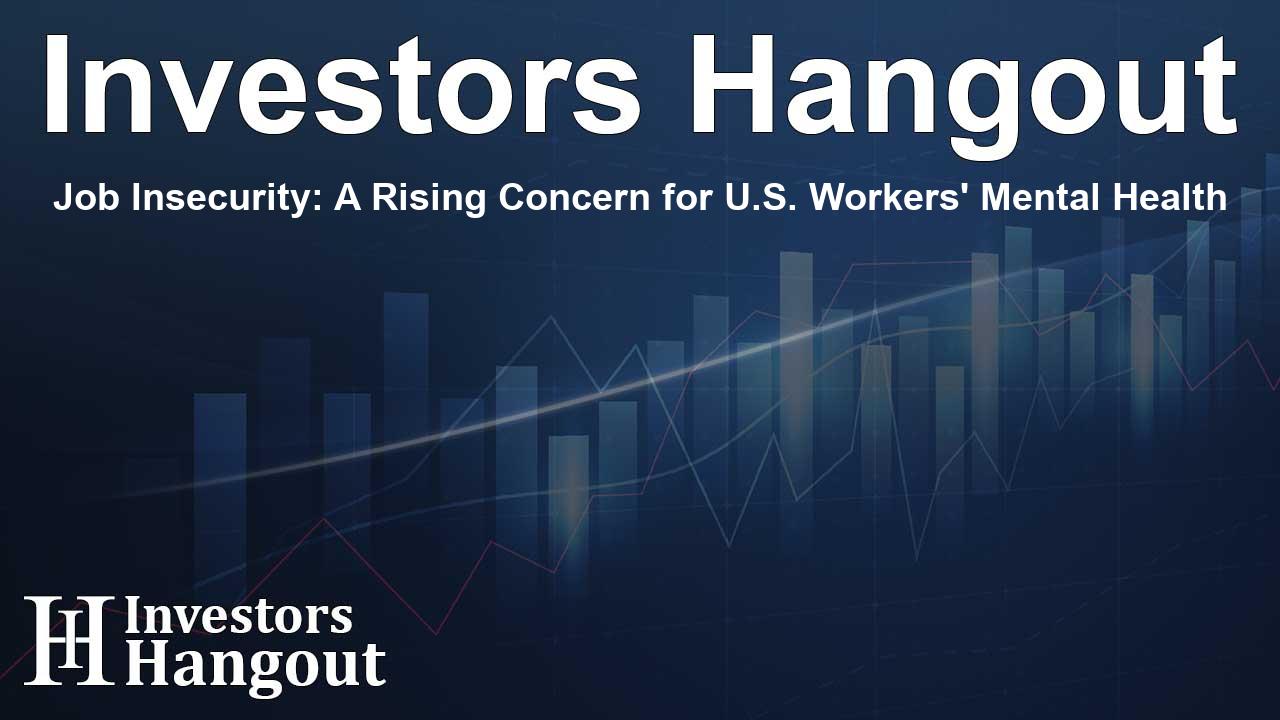Job Insecurity: A Rising Concern for U.S. Workers' Mental Health

Understanding Job Insecurity and Its Impact
Many individuals within the U.S. workforce are currently facing heightened stress levels due to job insecurity. Recent findings indicate that over half of working Americans are deeply affected by the fear of losing their jobs. Economic pressures and changes in government policies are contributing significantly to this sense of insecurity, leading to widespread mental health challenges.
Survey Insights on Workers' Concerns
According to a survey conducted by the American Psychological Association (APA), 54% of U.S. workers reported that the fear of job loss is influencing their stress levels at work. A substantial 39% expressed concerns that they might lose their jobs within a year, largely due to shifts in government policies and economic climates. The survey encompassed a diverse group of over 2,000 working adults, revealing alarming trends about job security fears across various sectors.
Perceived Impact of Government Policies
Two-thirds of the surveyed group indicated that their employment environments have been affected by recent policy changes. This has resulted in escalating workplace stress, as many individuals are now grappling with the uncertainty these changes bring. Arthur C. Evans Jr., the CEO of APA, emphasized that when job security wavers, it injects a sense of unpredictability that can ripple into every facet of an individual's life.
The Emotional and Psychological Consequences
The repercussions of job insecurity are substantial. Workers affiliated with organizations impacted by government shifts tend to experience various negative outcomes. The data highlighted that 28% of workers at severely affected businesses reported a lack of motivation, while 27% experienced emotional exhaustion. In contrast, only 16% and 18% of those at unaffected organizations reported similar feelings.
Understanding Workplace Stressors
Stress due to job insecurity can also impede personal well-being. Many workers indicate that worries related to future employment are affecting their sleep quality and personal relationships. Among the respondents concerned about job security due to economic conditions, 42% revealed that workplace stress disrupts their sleep, while 36% acknowledged negative impacts on their personal interactions.
The Role of Economic Fluctuations
Economic difficulties are central to discussions about job security. Notably, 44% of employed adults expressed fears that economic downturns pose a tangible risk to their employment status. This represents a marked increase from the previous year, highlighting a growing sentiment of urgency among American workers.
Preparing for Future Employment Challenges
Nearly half of the respondents indicated that finding alternative employment would be a daunting task if they were to lose their current positions. Among those fearing job loss due to shifts in policies, 66% shared this sentiment, demonstrating a deep-seated concern about future job prospects. Furthermore, 44% acknowledged that they might need to transition to completely different fields to secure new employment.
Strategies for Mitigating Workplace Stress
Recognizing the intricate relationship between job security and mental health is essential for both employers and workers. Evans pointed out the significance of addressing workplace stress proactively, as failure to do so could escalate into broader organizational challenges, including decreased productivity and increased staff turnover. Employers are encouraged to invest in supportive strategies that foster psychological well-being within their teams.
Empowering Employees for Better Mental Health
Employees also play a crucial role in managing their well-being. They must be proactive in prioritizing their mental health and recognizing the resources available to support them during challenging times. By fostering a culture of awareness and equipping individuals with coping strategies, businesses can create healthier work environments that encourage resilience and productivity.
Frequently Asked Questions
What is the main cause of job insecurity among U.S. workers?
Job insecurity is primarily driven by economic fluctuations and changes in government policies impacting employment stability.
How does job insecurity influence mental health?
Job insecurity can heighten stress levels, leading to emotional exhaustion and negatively affecting personal relationships.
What percentage of workers feel job insecurity affects their stress?
Research indicates that 54% of workers feel that job insecurity significantly impacts their stress levels.
What should employers do to address workplace stress?
Employers should implement evidence-based strategies that enhance psychological well-being and encourage open communication about mental health.
How can employees cope with job insecurity?
Employees are encouraged to prioritize their mental health, seek support, and develop skills that help manage stress effectively.
About The Author
Contact Hannah Lewis privately here. Or send an email with ATTN: Hannah Lewis as the subject to contact@investorshangout.com.
About Investors Hangout
Investors Hangout is a leading online stock forum for financial discussion and learning, offering a wide range of free tools and resources. It draws in traders of all levels, who exchange market knowledge, investigate trading tactics, and keep an eye on industry developments in real time. Featuring financial articles, stock message boards, quotes, charts, company profiles, and live news updates. Through cooperative learning and a wealth of informational resources, it helps users from novices creating their first portfolios to experts honing their techniques. Join Investors Hangout today: https://investorshangout.com/
The content of this article is based on factual, publicly available information and does not represent legal, financial, or investment advice. Investors Hangout does not offer financial advice, and the author is not a licensed financial advisor. Consult a qualified advisor before making any financial or investment decisions based on this article. This article should not be considered advice to purchase, sell, or hold any securities or other investments. If any of the material provided here is inaccurate, please contact us for corrections.
